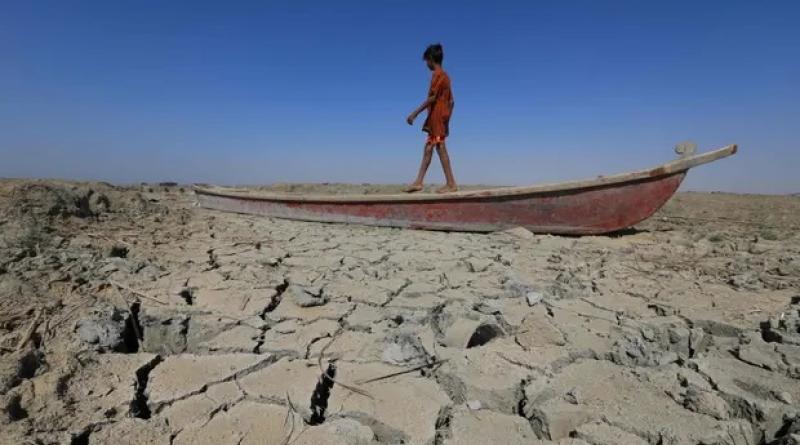Iraq’s oil boom blamed for worsening water crisis in drought-hit south

Western oil companies are exacerbating water shortages and causing pollution in Iraq as they race to profit from rising oil prices after Russia’s invasion of Ukraine.
Water scarcity has already displaced thousands and increased instability, according to international experts, while Iraq is now considered the fifth most vulnerable country to the climate crisis by the UN. In the oil-rich but extremely dry south, wetlands that used to feed entire communities are now muddy canals.
Mahdi Mutir, 57, worked as a fisher his entire life. For years, Mutir and his wife woke at dusk, sailing along a thick network of canals in Al Khora, a few kilometres north of Basra. The harvest was meagre but enough to provide food for the family of seven.
That changed last year. Now, at the height of the rainy season, Mutir’s boat lies stranded in the mud.
“It is the water station the Italian company built: they need water for their oilfields,” Mutir said, pointing at the black smoke rising from the Zubayr oilfield on the horizon.
To help extract oil, companies pump large quantities of water into the ground. For each barrel of oil, many of which are later exported to Europe, up to three barrels of water are pumped into the ground. And as Iraq’s oil exports rise, its water has dramatically fallen.
The Italian company Mutir is referring to is the oil and gas multinational Eni, which has been working in Iraq since 2009. Analysis of satellite images shows how over the past year a small dam, built by Eni to divert water from the Basra canal to its water treatment plant is preventing the seasonal flooding of the area where Mutir once used to fish.
Another nearby plant used by oil companies including BP and ExxonMobil accounts for 25% of the daily water consumption in a region of almost 5 million people.The Qarmat Ali plant, five miles south of the Eni plant, is operated by the Rumaila Operating Organisation (ROO), comprised of BP, PetroChina and the South Oil Company of Iraq. Water at the plant comes directly from the Abd Abdullah canal, which redirects freshwater from a river before it reaches the Shatt al-Arab, the river formed by the confluence of the Euphrates and Tigris rivers, and Basra’s main water source.
In a statement Eni said no fresh water was used by the company as the water from the canals is salty and polluted, and therefore it is not in competition with other uses. But the Guardian has seen on the ground and in satellite images how the water from the canals feeding Qarmat Ali and Eni’s under-construction Al Khora plant merges a few kilometres south of the two plants into a public water treatment plant that provides 35% of the water used by households in Basra.
Iraq’s impending water crisis has been well documented. In 2012, the US Energy Information Administration (EIA) reported that the country’s water needs for oil would increase tenfold. Without alternatives, it said, “water would have to come from local aquifers, which would compete directly with the needs for agriculture and consumption”.
Despite the warnings, little has been done. In 2018, an acute water crisis in the city resulted in 118,000 people being taken to hospital and led to violent protests. Demonstrators threw petrol bombs at government buildings and the security forces allegedly responded with live ammunition, leaving at least five people dead.
“Overall the volume of water injections required is not huge, but in water-stressed areas this can cause serious problems,” said Robert Mills, the chief executive of Qamar Energy, an independent consultancy, and author of a 2018 report on Iraq’s water injection needs. “In Basra, which has terrible water problems, in principle oil companies should find alternatives to fresh water” he said.
Alternatives exist. In Saudi Arabia, Iraq’s neighbour with comparable water problems and the world’s third largest oil reserve, water for injection is taken from the sea. In Iraq, discussions over the construction of a project to supply seawater have been taking place for more than a decade, but nothing has been done yet: “The ministry of oil does not have enough budget, and oil companies do not want to pay for it,” Mills said.
Iraq more than doubled its crude production in the decade leading up to 2019, and its output has only grown since Russia’s invasion of Ukraine in 2022. That year, exports of Iraqi oil to Europe rose by nearly 40%.
Last year, oil and gas companies recorded unprecedented profits. Eni doubled its 2021 results, netting £17.9bn, while BP, Exxon and TotalEnergies also recorded their most profitable years in recent history.
Iraq, however, has not seen a similar growth. “Iraq’s development indices resemble that of low-income countries,” the World Bank said in a 2022 report.
“Contrary to other countries they operate in, in Iraq most foreign oil companies do nothing to limit their environmental impact: for them it is just cheaper to keep polluting the environment,” said Walid al-Hamid, head of southern Iraq’s environmental agency. The department oversees inspections of oilfields and imposes sanctions for environmental damage.
In a document seen by the Guardian, Eni and BP are among the companies listed as having been fined. But many of the fines, according to Hamid, have never been paid.
Gas flaring – the burning of natural gas associated with oil extraction – is also a serious concern. In 2018, the gas flared within a 70km radius of Basra exceeded the total flaring volume of Saudi Arabia, China, Canada, and India combined.
In Zubair alone last year 2.5bn cubic metres of gas were burned, World Bank data shows, despite Eni’s claim in its 2021 annual report that the company was responsible for less than half that figure worldwide.
Eni said in a statement that although it leads the consortium of companies that operates the Zubair field, it is not the operator and does “not have control of the strategy for the field, or the responsibility for flaring … all of which sit with the Basra Oil Company [the national Iraqi company responsible for the oil in the south of the country].” Eni also said that it is not responsible for the fines levied by the environment agency, and that they should be paid by the Basra Oil Company, which operates the field in question.
The terms of the contract, the company added, “explicitly removes any responsibility for flaring, flaring reduction projects or community compensation”.
BP said it was also not responsible for the fines listed in the documents, and that the field in question was operated by the Rumaila Operating Organisation, a company it founded and in which it holds a 47.6% share.
cover photo:A boy walks on a boat left lying on the dried-up bed of a section of Iraq's receding southern marshes, June 2022. Photograph: Asaad Niazi/AFP/Getty Images




